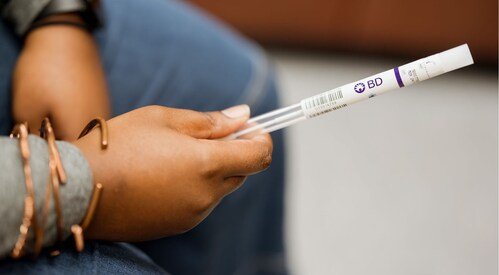
New FDA Submission Includes Self-Collection Swab and High-Tech Laboratory Robotics that Report More High-Risk HPV Strains Than Any Other Test
BD (Becton, Dickinson and Company) , a leading global medical technology company, announced it has submitted an application to the U.S. Food and Drug Administration for a new, at-home human papillomavirus (HPV) test that enables patients to self-collect a sample in the comfort of their own home using a swab the size of a Q-tip that simplifies processing at the lab and reports more high-risk strains of HPV than any other test on the market today.
"We envision a world where women are empowered with access and a choice for their HPV screening, whether it be in a routine visit at the doctor's office or the comfort and privacy of their own home via a self-collected sample," said Nikos Pavlidis, president of BD Diagnostic Solutions. "Cervical cancer and the loss of more than 4,000 women per year to this devastating disease is preventable, and we believe at-home testing is an important leap forward to our goal of eliminating this type of cancer."
When available, the new HPV test from BD will include a state-of-the-art self-collection swab technology that offers a safe, simple and non-invasive collection experience without the need for liquids or complex devices. The stability of the swab also allows for convenient mailing from home to the lab, removing logistical barriers and supporting broader participation in cervical cancer screening programs.
At the lab, the self-collected swab needs no manual sample preparation by clinical laboratory technologists, which allows them to focus on higher value work. The sample is simply placed into the BD COR™ System and the fully automated process uses sophisticated robotics to prepare, analyze and report results for each sample. Using an internal cellular control and minimizing manual touch and intervention ensures the integrity of the specimen from collection to delivery of dependable, high-quality results.
Importantly, the BD Onclarity™ Assay can also report more individual high-risk strains of HPV than any other test available today. This is a must-have attribute in today's testing paradigm, due to the shifting prevalence of high-risk genotypes beyond HPV 16/18.
In November 2024, a survey of more than 1,100 women in the U.S. conducted online by the Harris Poll found that 72% of women in the United States have delayed having a gynecology visit, with many highlighting the need for greater convenience, comfort and ease for this critical cervical cancer screening process. The study also found that 81% of women want more comfortable and less invasive HPV/cervical cancer testing options versus a pelvic exam, with 74% indicating interest in using a self-collection vaginal swab test at home in place of going to an office or clinic where a doctor uses a speculum to collect a sample from their cervix.
Earlier this year, the American Society for Colposcopy and Cervical Pathology (ASCCP) added the BD Onclarity™ Assay to its Enduring Risk-Based Management Guidelines, due to its ability to individually identify more high-risk types of HPV. Self-collection for HPV/cervical cancer screening is also among the draft recommendations by the U.S. Preventive Services Task Force (USPSTF), which helps guide health care providers in the U.S. about the effectiveness of specific preventive care services to improve the health of people nationwide.